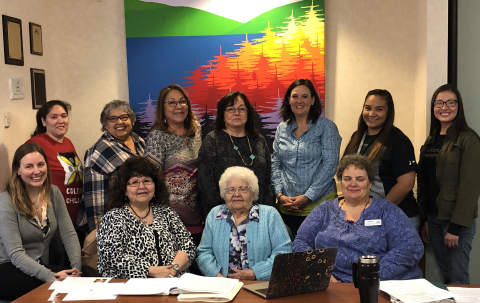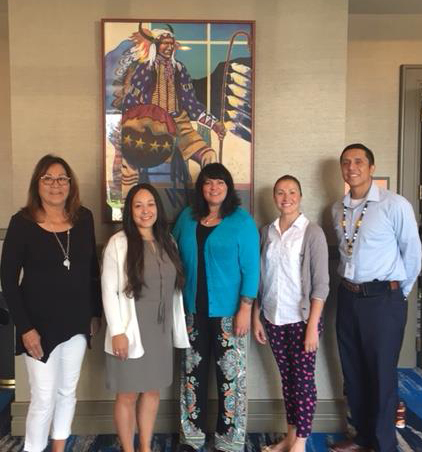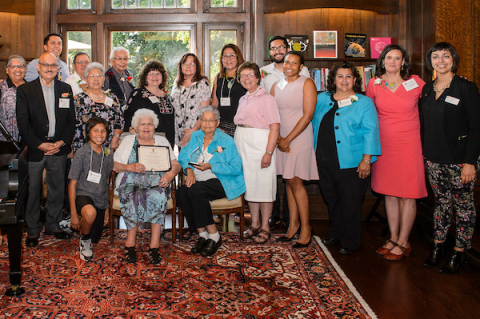A growing partnership between the Wisconsin Alzheimer’s Disease Research Center (ADRC) and the Oneida Nation of Wisconsin brings together scientists, aging and dementia experts, Oneida community members, and tribal leaders to raise awareness of Alzheimer’s disease and related dementias in American Indian communities across the state. The goal of this work is to understand how the disease affects elders and their families, expand memory care and caregiving resources, and extend research partnerships with the American Indian nation and tribal communities in Wisconsin.

These efforts are directed and informed by the Oneida Nation Alzheimer’s Disease Community Advisory Board (Oneida CAB), established in 2016 by the Wisconsin ADRC and the Oneida Nation.
The Oneida CAB’s current goals include:
- Provide targeted outreach and education to school-aged children, college students, middle-aged adults and Veterans
- Reduce stigma associated with Alzheimer’s disease and related dementias through outreach and education
- Continue efforts to improve access to culturally tailored memory care to tribal elders and their families
- Continue the Oneida CAB to guide culturally tailored outreach, education and research
If you have questions for the Oneida CAB, contact one of the following members:
Relationship building
The partnership between the Wisconsin ADRC and the Oneida Nation of Wisconsin is rooted in collaboration and guided by the needs of the Oneida community. It began in 2015 after members of the Oneida Nation Commission on Aging (ONCOA) sought to learn more about Alzheimer’s disease. ONCOA members wanted to support local elders in their community with education about memory changes and resources for people and families experiencing dementia.
ONCOA board member Mike Hill attended an Alzheimer’s Association state conference in 2015 where he met representatives from the Wisconsin ADRC. When Hill asked for more information about Alzheimer’s disease in Indian Country, he learned there was minimal knowledge among scientists because so few American Indians had been included in research studies. ONCOA wanted to change that.

An effort for change was led by former ONCOA Chairperson Wesley Martin, who, together with then ONCOA Coordinator Lois Strong, developed an educational event to help the Wisconsin ADRC and the Oneida Nation learn about each other. The event featured a dementia presentation by the Wisconsin ADRC's Carey Gleason, PhD, MS, as well as a presentation by Oneida members on Oneida history and resources available to Oneida community members.
Around the same time, Oneida Elder Services Director Florence Petri obtained state funding to hire Oneida’s first dementia care specialist, and in November 2015, Debra Miller was hired as tribal dementia care specialist with the Oneida Nation Comprehensive Health Division.
As services and awareness expanded, so did the need for education and outreach — ideally supported by data describing Alzheimer’s disease in American Indian populations. This led ONCOA member Marlene Summers to arrange a memory screening event at the Anna John Resident Centered Community building center in Oneida.
Through these collaborative UW and ONCOA activities, leaders from both groups eventually formed the Oneida Nation Alzheimer’s Disease Community Advisory Board (Oneida CAB). Several members of ONCOA were invited to serve on the original Oneida CAB, including Summers, Petri and Strong. The Oneida CAB set several goals to guide its work, focused on providing culturally tailored outreach, education and memory care to Oneida Nation tribal members.

In 2017, the Wisconsin ADRC enlisted Martin to serve as its liaison to the Oneida Nation. The work the Oneida CAB was accomplishing was benefiting its tribal members, and it wanted to share those resources beyond the Oneida community. A year later, Martin, also chair of the Great Lakes Native American Elder Association (GLNAEA), received a 3-year Community Catalyst Grant from the Wisconsin Partnership Program to sponsor dementia education events in conjunction with GLNAEA’s quarterly meetings. This helped spread awareness of Alzheimer’s disease and related dementias throughout tribal communities across the Upper Midwest.
The Oneida CAB/GLNAEA partnership has hosted brain health educational events in Tribal communities across Wisconsin, including Oneida Nation in Oneida; Lac Courte Oreilles Band of Lake Superior Chippewa Indians in Hayward; Menominee Indian Tribe of Wisconsin in Keshena; Red Cliff Band of Lake Superior Chippewa in Bayfield; and Lac du Flambeau Band of Lake Superior Chippewa Indians in Lac du Flambeau. Those events featured national experts in aging and dementia care in American Indian populations, including Dr. Blythe Winchester, Dr. Donald Skenandore and Dr. Neil Henderson.
The Wisconsin ADRC and the Oneida CAB would like to thank the people who helped foster its early relationship. Those people include Wesley Martin, Marlene Summers, Florence Petri, Lois Strong, Dr. Fabu Phillis Carter, Carol Hutchison, Dr. Megan Zuelsdorff, Dr. Dorothy Farrar-Edwards and Dr. Carey Gleason.
Addressing Alzheimer's Disease and Related Dementias Disparities
The American Indigenous Cognitive Assessment (AMICA) is a five-year research grant project (2022-2027), funded by the National Institute on Aging, that aims to develop a culturally appropriate dementia evaluation toolkit in partnership with the Red Lake Nation of Minnesota, Oneida Nation of Wisconsin, and the First Nations Community HealthSource in Albuquerque, New Mexico. The research team in Oneida, WI in collaboration with the Oneida CAB and the Memory Keepers–Medical Discovery Team at the University of Minnesota School of Medicine, Duluth Campus, will focus on adapting the current clinical tools: the Canadian Indigenous Cognitive Assessment (CICA) and the Australian Kimberly Indigenous (KICA) assessments for depression, cognition, caregiver reports, and activities of daily living which have been used in previous research with the Anishinaabe Indigenous communities of Manitoulin Island, Ontario, Canada.
For more information on this project, you may contact the AMICA Oneida Community Researcher, Cassandra Thomas (clthomas@medicine.wisc.edu).
Collaborations
The Oneida CAB has since formed important alliances that help it achieve its ongoing goals. Some of its partners and collaborators are listed below:
- Great Lakes Native American Elders Association (GLNAEA) — The Wisconsin ADRC and GLNAEA jointly host Alzheimer’s in Indian Country educational events in conjunction with GLNAEA’s quarterly meetings. The programs offer educational programming on brain health and the impacts of Alzheimer’s disease in Native American communities. Upcoming events will be listed on the Wisconsin ADRC events page.
- Memory Keepers–Medical Discovery Team at the University of Minnesota School of Medicine, Duluth Campus — Indigenous Cultural Understanding of Alzheimer’s Disease and Related Dementias — Research and Engagement (ICARE) is a collaborative grant effort between the Memory Keepers research team, scientists at UW–Madison and First Nation community members in Manitoulin Island, Ontario. The National Institute on Aging originally funded the grant in 2018, and in 2021 it received renewed grant support through 2026.
- Native American Center for Health Professions (NACHP) (pronounced nay-chip) at the UW School of Medicine and Public Health — NACHP works to improve the health and wellness of American Indian people. NACHP serves as a central location for American Indian students pursuing health careers to advance professional development, mentorship, research and support. NACHP partners with many tribes in Wisconsin on projects including tribal clinic rotations for students. Its assistant director, Melissa Metoxen, is a member of the Oneida CAB.
- Oneida Elder Services — The Oneida Tribal Aging Office connects tribal elders and families to aging resources and services. Its director, Eli Metoxen, is a member of the Oneida CAB.
- Oneida Nation Comprehensive Health Division — The Oneida Nation Comprehensive Health Division (known as Oneida Health Center in the community) coordinates caregiver resources and services for tribal elders and their families. The Oneida CAB works with the staff at Oneida Health Center to build its memory diagnosis program and public educational resources about dementia and brain health. Its tribal dementia care specialist, Debbie Miller, Drs. Christine Garstka and Jay Kennard, and nurse practitioner Annie Wells are all members of the Oneida Nation Alzheimer's Disease CAB.
- Oneida Nation Commission on Aging (ONCOA) — ONCOA is an advisory board that advocates on behalf of elders 55 years and older. Several members of ONCOA are also members of the Oneida CAB.
Learn more
In 2019, Dr. Neil Henderson was the keynote speaker at the Wisconsin ADRC Fall Lecture. Watch a video of his presentation “Diabetes and Dementia among American Indians.”
In 2019, Dr. Neil Henderson was a guest on the Wisconsin ADRC Dementia Matters podcast. Listen to the episode “Considerations for Caregivers in Indian Country.”




